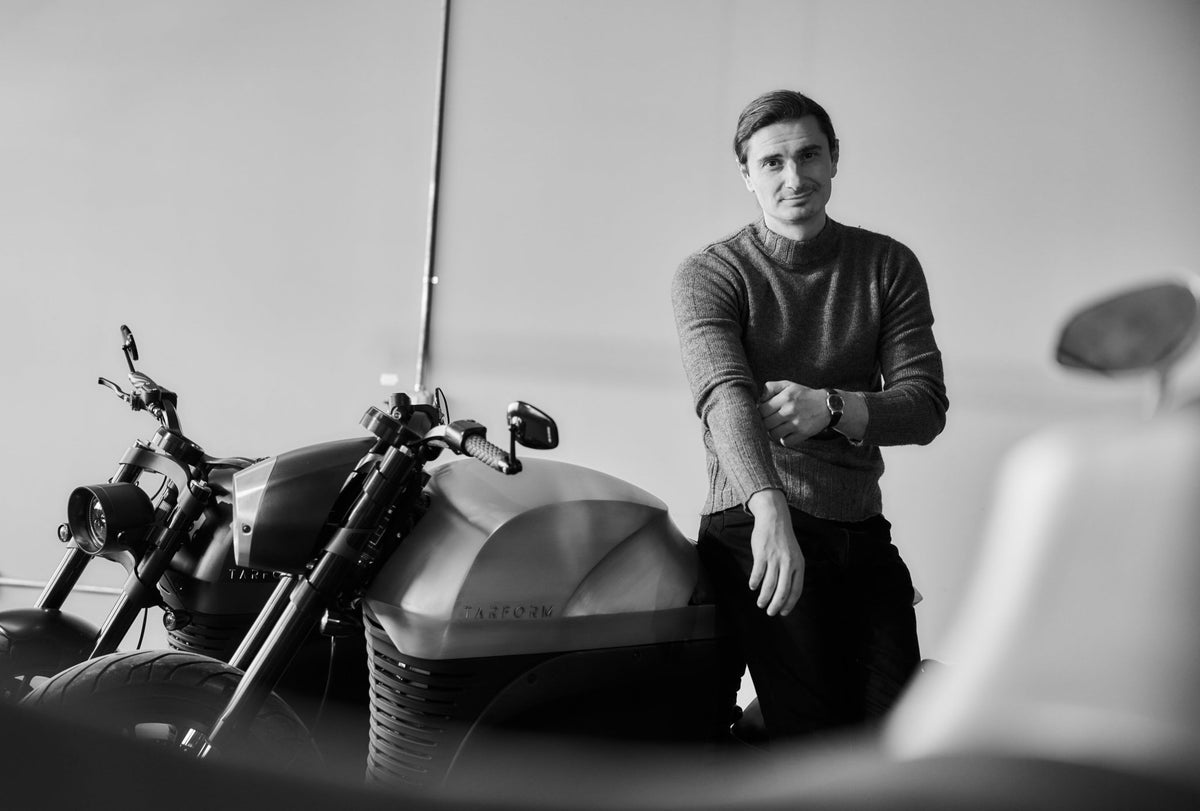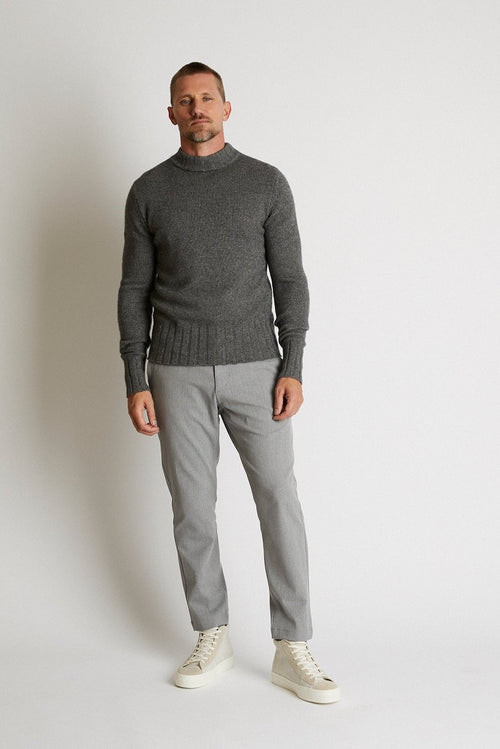No Products in the Cart

Tarform Unveils the Vera: A New Era of Electric Motorcycles for Urban and Trail Riders
Taras Kravtchouk - Founder of TARFORM In +Beryll GIANNI Sweater
Following the success of the Tarform Luna, a luxury electric motorcycle that has set new standards in design and sustainability, Tarform is thrilled to announce the launch of its second electric motorcycle (EV), the Tarform Vera.
The Tarform Luna, celebrated for its unique design and sustainable construction methods, has been featured at prestigious venues and events, including the Petersen Automotive Museum, The Barber Collection. It has been ridden by Lewis Hamilton for Wall Street Journal, been recognized as a Top 10 mobility solution by FastCo, and hailed as “The Motorcycle of Tomorrow” by the New York Times.
“Following years of engineering and development, we began deliveries of the Tarform Luna in 2022—a luxury, handcrafted motorcycle from Brooklyn. As we move forward, we're thrilled to introduce The Vera, an electric motorcycle aimed at higher production volumes, aligning with our strategic vision to grow into a leader in the premium EV mobility space.

Our experience delivering vehicles across the U.S. and Canada has enriched our transition from bespoke manufacturing to a scalable production method while maintaining our design ethos, allowing the Tarform brand and our vehicles to reach a wider audience.”
- Taras Kravtchouk - Founder / Chief Designer

+Beryll: The Tarform motorbike not only looks amazing and performs incredibly, but is also eco-friendly. Can you tell us about your journey to make this happen?
TK: Well, how far back should I go? (laughs) I started to build cars back when I was five years old.
+Beryll: Were cars and motorcycles always your passion?
TK: It was more than that. The process of building something out of nothing was and is my driving force. I am passionate about bringing function and beauty to simple things.
One of my first memories was when I was four or five years old, and I carved a little boat out of a raw piece of bark. I saw how I could transform wood into a beautiful, floating and functioning boat. I can still feel the excitement in that moment.

Taras Kravtchouk - Founder of TARFORM In GIANNI Sweater
+Beryll: Did you expect that you would build motorcycles as a child?
TK: Not at all! My conceptual idea of what I wanted to do with this passion of making things evolved. Besides making objects physically with my hands, I was also fascinated by computers. I built computers when these technologies were all about programming; this enlightened me to the relationship between craftsmanship and technology. To me, they always coexist.
+Beryll: The combination of passions for craftsmanship and technology is so rare. Did you always pursue both of these passions?
TK: To a certain degree, yes. When I was fifteen, one of my friends showed me Photoshop and I was stunned. That’s when I realized I wanted to go into design. I ended up studying 3D animation and got interested in industrial design, but never thought that I would end up in automobile design. Although I had posters of vintage Lamborghinis in my room, I never wanted to design cars – and motorcycles weren’t even in my field of vision.
Back then, I thought motorcycles were too loud and dangerous. I didn’t see any beauty in them until my friend bought an old Kawasaki bike. He showed up and my immediate reaction was “Oh no man – you bought a motorcycle? Why?” It didn’t make any sense. He kept bringing it over and I started getting used to it. He asked me if I wanted to sit on it, and with hesitation I did. Then he asked if I wanted to take it for a spin, but I had no idea how to ride. I took it for a ride in the countryside of Stockholm. It was terrifying, but also…
+Beryll: Exhilarating?
TK: Yes. You are just floating on this thing on the road; it was so different from the enclosed experience inside of a car. I suppose that was when I started looking at motorcycles from a different perspective.
+Beryll: What were the next steps on the road to building your first motorbike?
TK: I went to Australia and studied visual communication and industrial design, came back, and got a job at a design agency. We did everything from web design to branding. We made things look good, but also told stories behind the inspiration. We were working with startups and bigger companies, but my side gig was always something physical and tangible. On my weekends I built furniture. After I fell in love with my friend’s vintage bike, I started building custom bikes. At the time it was a passion, not something I wanted to pursue professionally. Regardless, I registered a company called Tarform when I was 23.

+Beryll: Tarform is a cool name, and fits perfectly with your first name, Taras. Is that where the name comes from?
TK: Tarform is a Swedish word that means “taking shape, taking form”. When I founded the company, I didn't know what I would do with the company. I designed tables, branded with Tarform. Then I made a kitchen knife branded in Tarform. These didn’t go anywhere. I started getting more and more interested in motorcycles and less and less into digital design. I found this vintage-looking bike from the 80s on the equivalent of Craig’s List. After taking it for a ride, I decided to take it apart because I wanted to understand what this engine was made out of. I didn’t have any mechanical training, but I fell in love with the process. Shortly after, I moved to New York.
+Beryll: What was the reason for moving to New York?
TK: My ex also worked in design, and she got an internship at a design agency in New York. I moved with her and continued to do my designs in New York and build my network. I remember one day I walked by this garage with tons of bikes – like vintage bikes. It was a community shop, so people could bring their bikes to be restored. I became a member. I bought a vintage bike from New Jersey and spent a lot of time there. I remember my girlfriend at the time complaining when I came home dirty and smelling like gas and oil. It was at this place that I really got interested in the building and craftsmanship process of custom bikes. There were so many people who were willing to teach me how to weld and how to fabricate something. So I started building my own custom bikes.

+Beryll: At this point, was building custom bikes just a hobby, or did it become your profession?
TK: My professional journey into building custom bikes began with an email from the English fashion company, Belstaff. They asked me to build a custom bike for their display case at a store in Los Angeles. I had never done a professional build before but I said “Okay cool I’ll do it.” I had 30 days to build it. So I went on Craig’s List and got this vintage bike from the 70s, a complete rust bucket. I spent every day at the shop, rebuilding it into a classic British racer. It was tons of work. When I finished it and shipped it, they asked me to build another bike. I was building these bikes and shipping them off to all their stores around the world, like in New York, Tokyo, and London. I kept doing it for years. At that point I thought I didn’t want to be a custom bike builder, since it takes so much time to rebuild a vintage motorcycle one by one. I had a small garage in Brooklyn and thought maybe there was something I could do to combine what I love, motorcycles and technology. I wanted to do something on a bigger scale, where I would feel a sense of purpose, and something bigger behind my work.
+Beryll: And that’s how the motorcycle company Tarform took shape?
TK: Yes. My custom bike-building business turned into a motorcycle company. I knew I wanted to make it as eco-friendly as possible, so we decided to build electric bikes infused with the iconic motorcycle spirit of the 60s and 70s. The essence of the company is incorporating everything I love in one project. Branding, storytelling, aesthetics, engineering, and experience was the ultimate manifestation of everything I learned how and wanted to do.

+Beryll: It seems you put everything you loved about motorcycles into one bike while making it sustainable and relevant in this era. Can you talk more about this?
TK: We had the opportunity to build from scratch and be more experimental. We didn’t have any baggage. We didn’t have to follow any established design. Looking at the industry at the time, there was nothing I found desirable in the field of motorcycles. So the Tarform had to have a unique aesthetic language
and design that made the bike stand apart. A big part of the way we build Tarform motorcycles was inspired by the negative effects that working with toxic materials and breathing in toxic solvents and resin had on my life. I thought, “There must be a better way to make things.” Knowing how much the furniture industry has shifted towards using plant-based materials, I wondered why we don’t see this progressive mindset in the automotive industry. So, we started implementing this into the prototype. We tried so many different materials, form coffee beans to pineapple leather – just because, why not? This become one of the cornerstones of Tarform; we want to reduce our carbon footprint as much as possible throughout the whole manufacturing process.
+Beryll: What are the organic materials you are currently using in your bikes?
TK: With our new bike, VERA, we have incorporated flaxseed fibers, algae, coconut task fiber, and apples – apple leather is a great vegan leather. We are dedicated to learning as we go, and see the strong possibility of scaling. You can build things on prototype, which can be expensive, but then you need to go into production, which is a different ball game. We still try to balance this – it hasn’t been easy because the industry is not ready yet. Most alternative materials are difficult to use on the scale for mass production. To incorporate these innovative sustainability practices more and more is our long-term vision.
+Beryll: I agree with you. The automotive industry, especially in Germany, is led by an older generation that still sees sustainability as a future practice rather than a current possibility. But, I strongly believe that the industry is going in this positive direction sooner rather than later.
TK: I hope so. It’s the same with fashion. The fashion and automotive industries are very similar in how established practices are. Whenever someone says they’ve found a groundbreaking new material, it’s usually hard to integrate it into the existing volume production.

+Beryll: I think all industries are going in that direction. Consumers are more educated, and at the end of the day, they are the driving force. If the consumers in this world decide to not buy any product that has a huge imprint on our environment, then these products would go away faster than we can speak.
TK: Exactly.

+Beryll: So for the new bikes, how do you distribute them? How do you market your product?
TK: Because the design of our bike stands out, and once you start reading about our mission, it’s clear that we’re not like your usual automotive manufacturing company. We have a different intention. The only way for us to get through the early days of manufacturing is by building a bike in the luxury category. Which means premium materials, premium craftsmanship, and low volume. Asking ourselves, “What is the best motorcycle we can build given the means we have?” It’s like the Tesla model – starting in a premium space, and then introducing more affordable models after building the brand. All of the bikes are assembled right here in Brooklyn. After years of learning and building these, a lot of customers are like “Wow great! But can you launch a beautiful bike we can actually afford?”
So, next week we are going to release a $16,000 bike that still preserves the same design ethos, while aimed at volume manufacturing.
+Beryll: Tell us more about this new bike.
TK: The new bike is called Tarform Vera, “Vera” means faith in Ancient Greek.
. And who doesn’t want to have faith sitting on a motorbike (laughs). This bike is engineered as an all-around street and scrambler motorcycle. It offers an exhilarating performance with a 0-60 mph acceleration in 3.5 seconds, a top speed of 85+ mph, and a 100-mile range, all while maintaining a lightweight profile at 360 lbs. We designed Vera to cater to both urban riders and weekend trail enthusiasts. Vera is a significant milestone in our mission to redefine mobility with a blend of performance, design, and environmental stewardship.
+Beryll: What are your design principles?
TK: They are very simple. I grew up doing martial arts and have always been interested in Eastern philosophy. It is about refinement and essentialism. Whatever I approach I try to reduce it to its bare essentials and find the perfect balance and proportions. If that feels right, you can build out from it. I feel that sometimes people focus too much on the details and lose the basics. What is it that makes you look at something and feel an immediate attraction? It's never about the shiny little details; it's usually about harmony, balance, and composition. If you get that right everything else kind of falls into place. And then it evokes a feeling. And that’s when it all makes sense.

Tarform Website - www.tarform.com
Reserve a Tarform Vera - www.tarform.com/vera
Tarform Instagram - https://www.instagram.com/tarform/
Contact: info@tarform.com
Gianni Sweater



